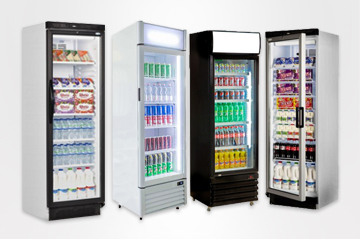Fridges for commercial use are essential for storing everything from ingredients to prepared food. Unlike residential fridges, commercial refrigeration units such as walk in fridges and meat chillers come with heavier compressors in order to better withstand rough usage. As such, they have enhanced cooling capacities for improved preservation and storing of food products.
Most food businesses, from small cafes and corner shops to restaurants and supermarkets all require Fridges for commercial. However, there are important factors which business owners must consider whilst in the market for a commercial refrigeration unit:
Table of Contents
How much will it cost to purchase a commercial refrigeration unit?
Firstly, let’s talk cost. It’s important that you establish a clear budget for your business when purchasing a commercial refrigeration unit. That said, business owners operating under a limited budget may want to weigh up the pros and cons of a cheaper, lesser-know brand as opposed to a slightly more expensive unit from a better-known manufacturer.
While a reputable brand might be more expensive, the maintenance expenses that they might incur during service might outweigh any initial costs. As such, investing in a commercial refrigeration unit might be the smarter move in the long run.
Why commercial refrigerator brands matter
As mentioned above, it is imperative for long-term success that your business invests wisely when purchasing commercial fridges. The quality of services you provide to your customers can often rely on how reliable tools and appliances which your business use. In order to reduce risks of equipment failure, it’s important to look out for a reliable manufacturer, such as Daikin, when purchasing commercial fridges for your business.
What refrigerator style is best for your business?
While searching for the ideal commercial refrigerator unit for your business, you will undoubtedly come across a plethora of different styles. As such, it’s important to narrow your search and look for a unit that best meets your businesses exact requirements. If you were in charge of a supermarket, for example, it would be best to look at larger units; preferably with glass displays to both store products and to put them out on display.
Different commercial refrigeration units also have varying levels of cooling insulation. Take solid door styles – these commercial fridges provide better insulations levels as they are capable of limited heat transfers from inside to outside. This quality makes them better suited for storing perishable goods as temperatures will be consistently balanced. By comparison, glass door commercial fridges are not ideal for either cooling or insulation as there is a thin barrier between inner and outer parts which result in easier heat transfers.
Why energy efficiency matters
As commercial fridges incur high running costs for business, it is recommended to pay close attention to how energy efficient your desired unit is. The better the energy star rating that a refrigeration unit has, the less expenses your business will need to pay to keep it running effectively.
Carry out space planning before buying refrigerator units
Finally, you should ensure you take some time to carry out careful space planning for your business. Measure the available area at your premises so you can have a better idea of exactly what commercial refrigerator type your business is able to have. Do your business premises have the capacity for swinging doors? If the answer is no, consider looking at models with sliding doors instead.
Final thoughts
Once you’ve factored in all the above, you should be able to make an informed decision when purchasing your Fridges for commercial use. One final piece of advice for business owners would be to consider investing in a service plan from a local refrigeration equipment supplier to ensure that your unit is routinely serviced for additional piece of mind.






